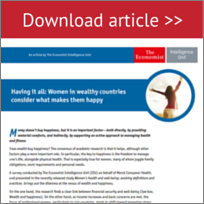When it comes to designing programmes to enhance women’s well-being, policy makers the world over tend to miss the mark. Programmes mainly focus on physical health—especially on reproductive and sexual health. While this is certainly important, the bigger picture is even more so. Wellbeing has manifold components, of which physical health is but one. The other components include emotional balance, social connectedness, and a sense of accomplishment in life. Well-being also depends on addressing such practical issues as adequate child care, quality nutrition and opportunities for exercise. Yet “everywhere, women’s health policy concentrates on reproductive and sexual health,” says Isabel Yordi Aguirre, a gender and health specialist for the World Health Organisation (WHO).







